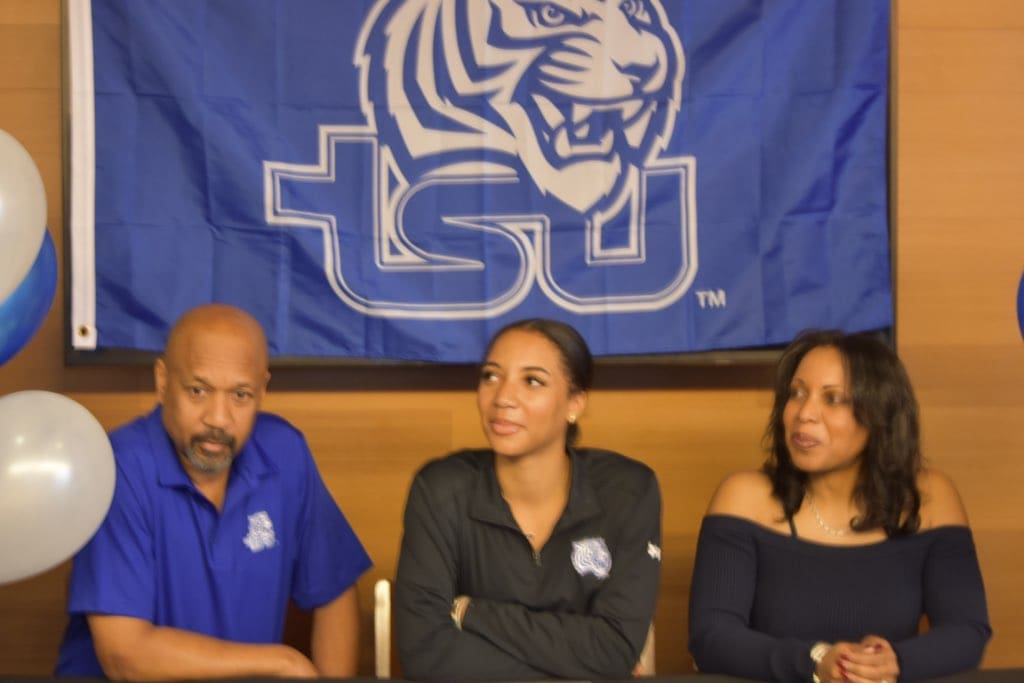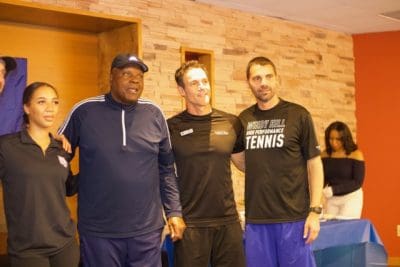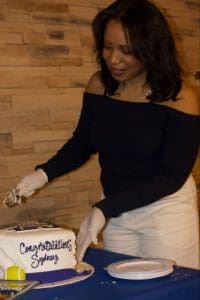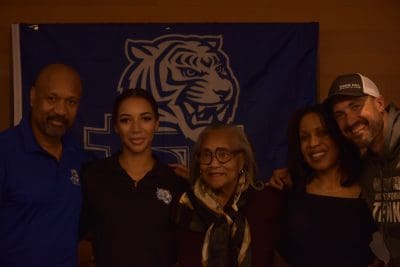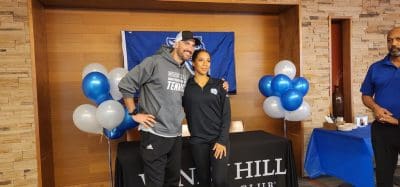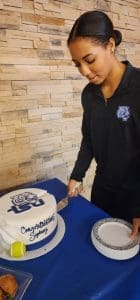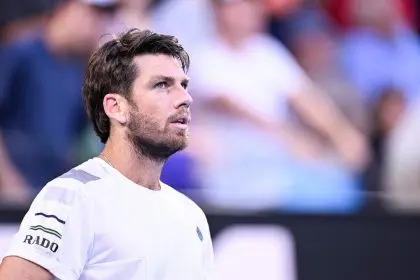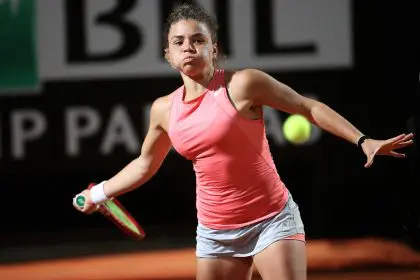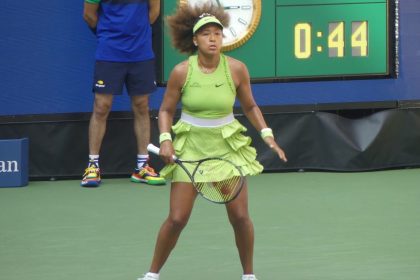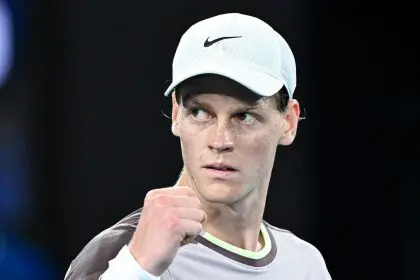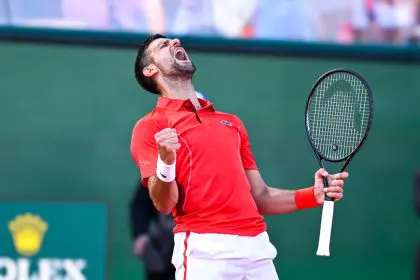Sydney Brantley, an elite tennis player graduating from North Atlanta High School this spring, has decided to continue her athletics career at Tennessee State University, where famous athletes like Olympians Wilma Rudolph and Wyomia Tyus and other notables like Oprah Winfrey and Maurice White of Earth, Wind and Fire attended.
Munson Steed, the CEO and publisher of rolling out, had a chance to discuss her exciting future prospects.
[Editor’s note: This is an extended transcription. Some errors may occur.]
Munson Steed: Congratulations on signing with the Tennessee State tennis team for a full scholarship. Why did you decide to sign with Tennessee State?
Sydney Brantley: Thank you so much. It took a lot of hard work to get to this point. [The] college recruiting process for tennis, and frankly for any sport, is extremely tedious and challenging, so my answer to your question on why I decided to sign with Tennessee State has two parts.
The first part of my answer is regarding my decision to go to an HBCU while I had offers from several schools, including some amazing PWIs. After visiting [several] schools, the difference in the cultural values and sense of community steered me towards desiring an HBCU experience for my undergrad journey. The second part of my answer centers on [my experience] at TSU during my unofficial visit around homecoming. While it is easy to be drawn to any school due to the spirit of homecoming, I credit the amazing women’s and men’s tennis teams and the coaching staff who made the experience unforgettable. I was there when the team could’ve just gone through the motions and gone on with their homecoming festivities. However, they made an effort to make me feel included by inviting me to attend different events with them, showcasing [the school’s good and the not-so-good].
The coaches were also extremely welcoming. [During] my short visit, it was evident how invested they were in each player’s [growth] as athletes and, more importantly, as people.
This reaffirmed that TSU could be my home for the next four years.
Why Sydney chose an HBCU
MS: Academically, you could’ve gone anywhere in the country that you wanted to go. Why did you choose to go to an HBCU and be an athlete?
SB: As I mentioned previously, the cultural values and sense of community at HBCUs across the board [drew me towards] an HBCU. In addition, witnessing the difference between how athletes are treated assured me I would be much more appreciated attending an HBCU, where they care for you as a person, regardless of your athletic performance, which may not always be the reality at all PWIs. Sometimes, you can be overlooked as just a number and a profit engine by your school as an athlete. I also recognize the increased interest in NIL could be better leveraged to build my personal brand at an HBCU where I have an opportunity to network with people who are like me and [have] possibly walked in my shoes before.
MS: Describe how it felt to have several options and offers to attend college free of charge based on your academic preparation and phenomenal skills as a tennis athlete.
SB: While it is a blessing and a privilege to be given full scholarship offers and [options] for where I could attend school, it was [extremely stressful]. I was presented with many great options with excellent coaches and welcoming teammates, so it was tough to narrow down the list. Once I did, it became even more difficult because it dawned on me that this was a monumental decision that would [change] my life. I will say it helps to [remind] myself how blessed I am to even have that choice [because] some students can only dream of being in this position.
MS: Describe the journey and discipline it took to prepare you to be a phenomenal tennis athlete.
SB: [Looking back], I can say that the journey was not a straight shot. It had its ups and downs, trials and tribulations, and several moments where I thought I wouldn’t [reach] my goals. [Honestly], the discipline part did not come easy, and I would say I’m still not 100% where I need to be with that. Growth is a process and a lot of the progress that I [have] made all boils down to the help and guidance [of] my parents and my coaches. My parents were in my ear almost 24/7, reminding me of who I am and what I’m capable of, and my coaches were really good at making me think I’m being lazy. I’m joking! Seriously, [the] coaches I’ve had over the years have motivated me beyond belief through words of encouragement, constructive criticism, being great role models themselves, and, again, lots of running.
MS: Why would you encourage other young African Americans to play tennis?
SB: Tennis is [a] global sport, and some people don’t realize the reach that even knowing how to play tennis gives you. One of the main reasons I would encourage other young African Americans to play tennis is [the opportunities] you are presented. There are obvious benefits, like becoming more athletic and meeting new friends within your tennis center and tennis community. There is also the potential of growing into a competitive tennis player who travels the country and world for tournaments, sometimes for free.
There are also so many rising stars within the African-American tennis community who are extremely open to giving back to [those] who may follow in their footsteps. With that being said, the United States Tennis Association [and] many local tennis programs have invested specifically in [developing] rising African-American and minority tennis players. I know I have been [allowed] to travel across the country, meet new people from all over the world, go to big professional tennis tournaments, and play with some of the best American professionals through those types of programs. I would encourage everybody to look into them and see how beneficial they are to minorities in the tennis community.
MS: What have you learned about yourself and the importance of discipline and focus?
SB: Something I’ve learned about myself and the importance of discipline and focus is that everyone doesn’t master it [simultaneously]. I used to be extremely stuck in watching what other people did and judging myself based on how they were doing in life, tennis, socially, etc. It took me a while to realize that not everybody moves at the same pace, and my version of discipline might not look like the person next to me. I am not saying that I could change the dictionary definition of discipline to fit how I was, but my routines and how I accomplish things do not have to be the same as somebody else working towards similar goals. I also became aware [that] it takes different motivating factors for me to focus on tasks and goals, and that’s OK. Becoming in tune with what works best for me is one of the most important things I’ve learned about myself and for myself. It has helped me get close to mastering [discipline], focusing on my goals, and becoming my best self.
Sydney learned from her life coaches
MS: Your parents have been your life coaches so far. How would you describe the support of you along this tennis journey?
SB: To answer this question simply, I couldn’t have done any of this without my parents for obvious reasons like the fact that I quite literally wouldn’t be here without them and that they’ve had to pay for years of tennis lessons and tournaments and travel, but also because of the fact that they were always there to pick me up. When I was down from my first loss to my first tough lesson where a coach yelled at me, through challenging classes, rejections from college coaches, losing friends, mental health issues, everything you could think of…they were there for me even when I attempted to push them away. With tennis specifically, my dad has always been there by my side, taking me to tournaments, waking up early to drive me to practice, [and] coaching coaches about what I [needed] since he’s been there through my tennis journey since Day 1. He has sacrificed so much to see me reach my goals, and [I am] so grateful for that.
MS: Describe being from Atlanta and the expectations of greatness that you know you have a legacy to continue.
SB: Atlanta, Atlanta, Atlanta! This city is something else, and while I might complain that I want to leave so badly and explore a city that I am not familiar with, I know that I will never truly be able to leave my home behind. Not only has the city raised me and shown me so much, but it has [also] given me so many opportunities that I probably [wouldn’t have] gotten living [elsewhere]. Aside from that, having such a deep-rooted history within the city and having parents [who] are quite literally an image of black success can be a lot of pressure. [Still], it is also motivation to strive to be the best version of myself. I strive to be the best example to younger people within my community and to give back to those [who] are less fortunate than me, representing my city and my family in the [utmost] positive light. Though none of these tasks will be easy, I have faith that [my path] in life will lead to success. It will be a long and challenging road; however, I know my roots will keep me balanced, stable, and able to grow through anything.

